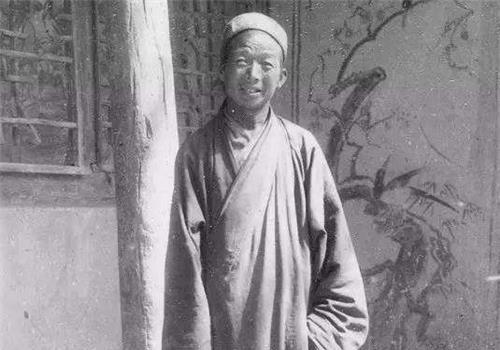Dunhuang Mogao Grottoes, located in Dunhuang at the western end of the Hexi Corridor, was built in the pre-Qin period of the Sixteen Kingdoms, and has formed 735 caves over several generations, with 45,000 square meters of murals, 2,415 clay painted sculptures, and a treasure house of Buddhist art with various scriptures, documents and portraits.

However, in the passage of time, dunhuang Mogao Grottoes were also buried in the yellow sand, and the person who shoveled this yellow sand was a Taoist monk, this Taoist monk was called Wang Yuanzhen, who had a lot of controversy in history, and this controversy was that Wang Yuanzhen "caused" the loss of Dunhuang cultural relics.
Wang Yuanzhen, born in 1850 in Macheng County, Hubei Province, in the late Qing Dynasty, the Western powers continued to plunder, all kinds of reparations pressed them breathlessly, life forced Wang Yuanzhen can only go out to make a living, he went to Jiuquan, in order to be able to eat a mouthful of food, into the Taoist practice, known as Wang Daoist.
As a Taoist priest of Taishang Laojun, he became the guardian of Shakyamuni, and he did not know whether Wang Yuanzhen moved the Buddha, in 1892, Wang Yuanzhen came to Dunhuang Yunyou, here I don't know how many people have walked, but Wang Yuanzhen accidentally found this treasure house in Yunyou.
On the epitaph of Wang Daoshi, it is written like this: The sand has a crack in the wall, as if there is light, and if the wall is broken, there are small holes, suddenly open, containing thousands of volumes of the Tang Classics, many antiquities, most of the people who see it are wonders, and those who hear it are rumored to be gods. Ever since he discovered this place, Wang Daoshi has felt a deep sense of responsibility.
He took the initiative to take on the work of cleaning up the sediment, collecting donations everywhere, in order to attract attention, Wang Yuanzhen walked 50 miles to find the local Zhixian and presented two volumes of scriptures, but the local Zhixian regarded the two volumes of scriptures as waste paper, and Wang Daoshi's help was fruitless, and he could only do his meager efforts to protect cultural relics.
In 1902, another Zhixian Wang Zonghan came from Dunhuang, who was very researched in epigraphy, and Wang Yuanzhen reported this situation to him, and Zhixian surveyed it with his men and horses, and took away a few scrolls of scriptures by hand, so that Wang Yuanzhen could guard here, and then there was no follow-up.
Wang Yuanzhen was not reconciled, and with two boxes of scripture scrolls, he rode all the way to Suzhou on a donkey, ate and slept in the wind, traveled more than 800 kilometers, and found Daotai Tingdong, who was then an Ansu soldier, and as a result, Lord Tingdong thought that the words of the scriptures were not as good as his words, Wang Yuanzhen was disappointed again, and he even dared to write a letter to Cixi, but the stone sank into the sea.
Wang Yuanzhen could only return to the Dunhuang Mogao Grottoes, continue to clean up the sand, day after day to watch this treasure house, in 1907, an Englishman Stein found Dunhuang, Stein and Wang Daoshi cleaned up together, in the two-month long night long talk, Wang Daoshi was touched by him.
This was the first time that someone accompanied him to guard the treasure, so much so that when Stein proposed to take some Dunhuang relics with him, Wang Daoshi did not stop it, according to the "Archaeological Record of Stein's Western Regions".
He regretted that he did not have the courage and courage at that time, listened to Master Jiang's words, accepted a large sum of money from me, and gave me the entire collection of books. After being harassed by the government, he was so frightened that he hid the Chinese writings, which he regarded as particularly valuable, in a safe place."
From Stein's records, Wang Daoshi accepted a sum of money, but this time the cultural relics were taken away with the permission of the local government, and Wang Daoshi did not leave Dunhuang until his death, just outside the gate of the Mogao Grottoes, there was a tower, that is, the tombstone of Wang Daoshi.
Originally a priceless Dunhuang cultural relic, he bought it to the British because of his own selfish interests